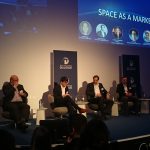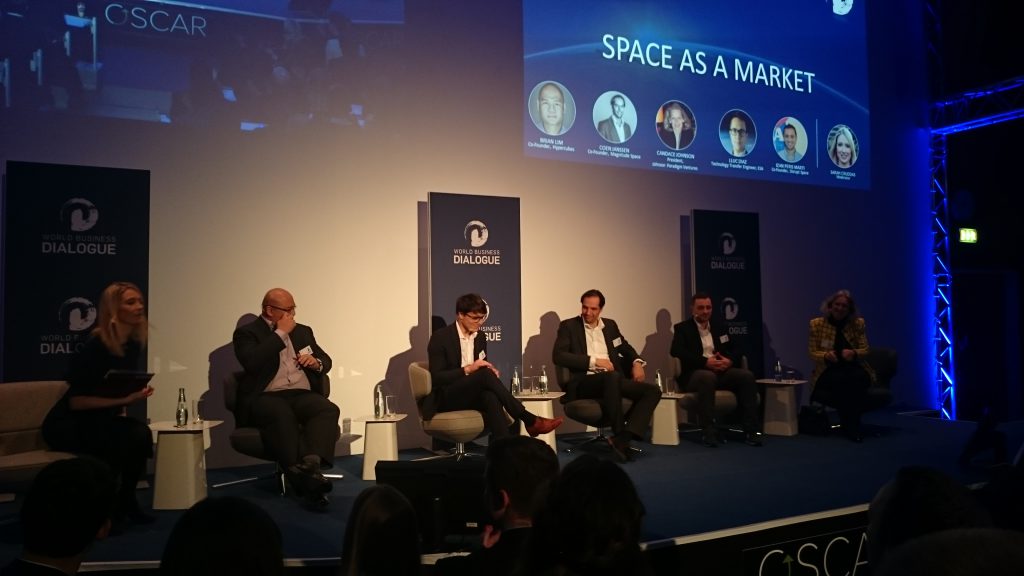The largest international student-run business convention, The World Business Dialogue is in its 20th year. It is a place for students to interact with companies, speakers and students from all over the world and is hosted annually by the non-profit Organisationsforum Wirtschaftskongress (OFW).
This year’s theme “facing change” included topics such as artificial intelligence, future energy supply, financial markets, transformation in transportation and insurance technology (insurtech). It was therefore appropriate, given the rapid growth and changes in the space sector that this should be a panel topic. Powered by THE HUS.institute, the panel explored “Space As a Market” and looked at the challenges in the sector and how it is evolving.
THE HUS.institute is a new thinktank based in Liechtenstein and is exploring. the transformation of the old economy into the Digital Modern era. This includes space technology (spacetech), financial technology (fintech) and clean technology (cleantech). Keen to drive the small country into the 22nd century, it wants Liechtenstein to lead by example. To this end, it aims to host the UN Innovation Lab here in Europe and wants Liechtenstein meet all 17 Sustainable Development Goals. It believes in “local governance as a global service” and this can be enabled by space.
Space is considered a key enabler of the global economy, through satellite data, communications and navigation. It continues to transform our lives. As we seek more connectivity and more data, space technology is key.
“Shoot at Mars – and land in Liechtenstein?” asked Christopher Peterka of THE HUS.institute on his vision for the country to “become the global home to space impact investments”.

The main panel included serial entrepreneur Brian Lim of Hypercubes; Coen Janssen, Co-Founder of Magnitude Space; Lluc Diaz, of the Technology Transfer Office at the European Space Agency (ESA) and Izan Peris Marti from Disrupt Space, and was moderated by space journalist and broadcaster, Sarah Cruddas.
“Space gives us a different perspective… It is important we have the right tools. Space gives us a bird’s eye view”…”People are trying to find new and innovative ways to put things into orbit… and removing it from orbit” said Brian Lim on the uses of space technology.
“How can we enable the next generation of space pioneers [in Europe]?” Sarah asked the panel.
“There’s a large pool of talent but lack of business skills in the space sector,” said Izan Peris, co-organiser of the Disrupt Space Summit that aims to change that.
Disrupt Space, together with initiatives such as StartUp Weekend Space, the International Space University (ISU)’s Space Studies Programme (SSP) and INNOspace enable innovation and creativity to flourish through an international mix of multiple disciplines.
“What can Europe do to nurture space as a market?” asked Sarah.
“The task for the space sector is to have an outreach layer… [This is] key to open up the sector,” Izan Peris Marti, Disrupt Space.
To many “rocket science” seems complicated. Space is something still considered inaccessible and expensive. But in recent years, launcher technology has improved, costs have come down in price and satellites have become smaller and lighter. This has paved the way for more and more commercial business opportunities.
For many investors however, space is considered a risky business compared to other sectors. “Space reuses (many) things we know that work…This helps minimise risk.” said Lluc Diaz from the Technology Transfer Office at ESA.
Raising awareness is an important part of what we are aiming to do here at Spaceoneers. The commercial space sector is very much alive here in Europe and we want you to be part of it! By portraying entrepreneurs and technologies, and highlighting the opportunities that are opening up in this ‘new space’ economy in Europe we aim to spur creativity and innovation within the sector.
Shown at the end of the panel, “Wanderers” depicts a vision of humanity’s expansion into the Solar System, based on scientific ideas and concepts of what our future in space might look like. What we want to do is make imagination a reality.

